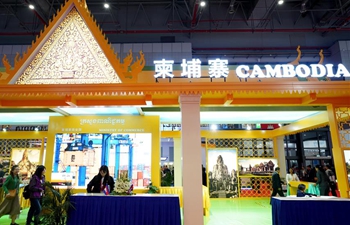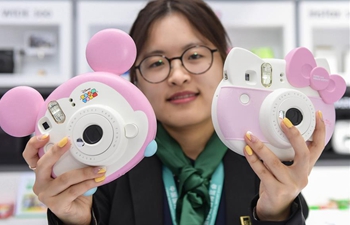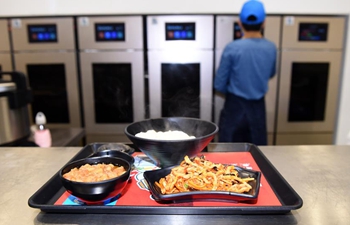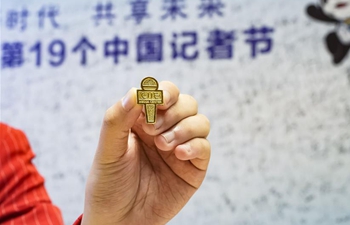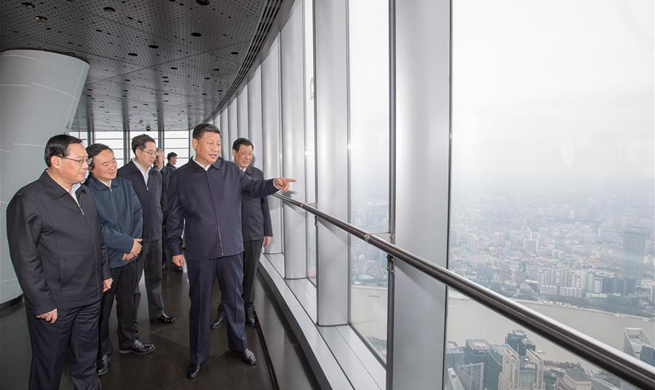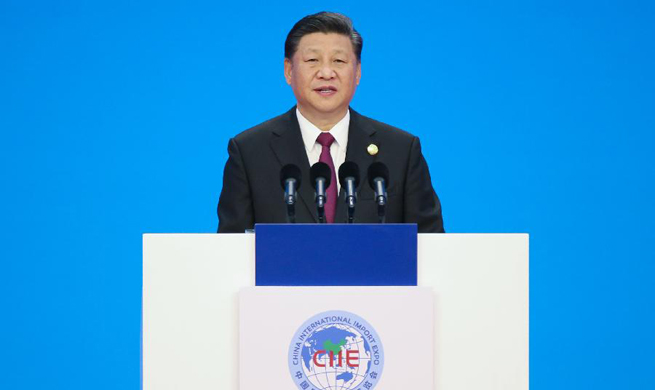HANGZHOU, Nov. 8 (Xinhua) -- The World Internet Conference (WIC), currently being held in eastern China's Zhejiang Province, has unveiled the top 15 of the latest scientific and technological achievements in the global internet industry.
Fifteen of about 400 entries from countries including China, the United States, Britain, Germany, France, Russia and Canada were presented during the announcement ceremony on Wednesday.
Co-chaired by Whitfield Diffie, winner of the 2015 Turing Award, and Wu Hequan, academician at the Chinese Academy of Engineering, the recommendation committee of over 40 Chinese and foreign technologists started collected submissions in July.
Among the final entries are WeChat mini programs of Tencent, the artificial intelligence (AI) processor of Huawei, the intelligent cybersecurity protection system of 360 Group, the automatic driving open-source platform Apollo of Baidu, the smart service of U.S. electric carmaker Tesla, the fully-integrated 5G NR Millimeter Wave (mmWave) & Sub-6 GHz RF Modules of U.S. chip giant Qualcomm, the supET Industrial Internet Platform of Alibaba Cloud and technological support for smart homes from Microsoft and Xiaomi.
Pony Ma, chairman and CEO of Tencent Inc., told participants of the conference that WeChat mini programs are small applications that function within the instant messaging platform, freeing users from the trouble of downloading or installing apps.
The committee says the technology is an innovative breakthrough in the field of mobile Internet.
Currently, more than 1.5 million app developers extract the core functions of their products and build them into mini programs without developing separate programs and terminal adaptations for iOS and Android systems, which "offers a Chinese solution to the global problem of cross-system app development," said Ma.
With the capacity to process thousands of pictures in a second, Ascend 310, an AI processor developed by Chinese telecoms equipment giant Huawei, can provide technological support for driverless vehicles and automatic production lines.
In October, Huawei and Audi announced their joint innovation in L4 automatic driving, unveiling the new Audi Q7 as a demonstration of this state-of-the-art technology.
The total energy consumption of the processor can be reduced to about 200 watts, said Yan Lida, director and president of Huawei's BG enterprise.
Meanwhile, Tesla's smart services provide instant solutions for drivers whenever they encounter troubles on their journey, and Qualcomm at the event presented the world's first fully-integrated 5G NR Millimeter Wave & Sub-6 GHz RF Modules for smartphones and other mobile devices.
The Qualcomm innovation allows terminal device producers to offer attractive form factors combined with the benefits of extremely high speeds from mmWave 5G NR. The market launch of such devices could be as early as the first half of 2019.
The supET Industrial Internet Platform developed by Alibaba Cloud provides manufacturing enterprises with one-stop digital, networked and intelligent services, which further integrates next-generation information technology and real economies.
Microsoft also provides a security solution, named "Azure Sphere", to the Internet of Things (IoT).
The corporation's executive vice president Harry Shum introduced a futuristic scene where users could receive a message from their smart refrigerator, saying "Hello, your freezer compressor has broken down. You'd better come home tonight, otherwise the food inside may go bad."
"As technologies including AI and IoT are spreading widely, the once-a-fantasy ideas can become a reality one day. Nowadays, televisions, light bulbs and alarm clocks all can be controlled by the voice assistant on your phone or an AI loudspeaker," said Lei Jun, founder, chairman and CEO of the Xiaomi Corporation.




